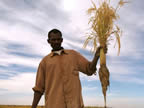 Earth Day,
which falls on April 22 this year, is of course very relevant to SRI!
Using less water, less agrochemicals, and less seed to get higher
yields can help reduce the growing assault on the earth's resources and
environment. The System of Rice Intensification
also has a role to play in mitigating climate change by 1) reducing
standing water (see photo at left), leading to decreased methane
emissions; 2) reducing inorganic fertilizer use, leading to decreased
carbon and nitrogen emissions from manufacture of fertilizers and their
subsequent transportation over long distances; and 3) sustainable
increases in the productivity of existing land, preventing the
conversion of carbon sequestering forests to agricultural uses.
Earth Day,
which falls on April 22 this year, is of course very relevant to SRI!
Using less water, less agrochemicals, and less seed to get higher
yields can help reduce the growing assault on the earth's resources and
environment. The System of Rice Intensification
also has a role to play in mitigating climate change by 1) reducing
standing water (see photo at left), leading to decreased methane
emissions; 2) reducing inorganic fertilizer use, leading to decreased
carbon and nitrogen emissions from manufacture of fertilizers and their
subsequent transportation over long distances; and 3) sustainable
increases in the productivity of existing land, preventing the
conversion of carbon sequestering forests to agricultural uses. However, while SRI does help to protect the environment, using SRI methods also helps farmers to adapt to climate change: Stronger roots (as shown at right by Harouna in Timbuktu) help rice plants resist lodging in inclement weather,
better withstand drought conditions, and, as indicated in recent
reports from Sri Lanka, even help withstand flooding!
Since less water is required, more farmers can share the available
water when increasingly unpredictable weather patterns cause water
shortages. In fact, state governments in Tamil Nadu, Bihar, and elsewhere in India are currently promoting SRI, partly due to water savings with SRI.
However, while SRI does help to protect the environment, using SRI methods also helps farmers to adapt to climate change: Stronger roots (as shown at right by Harouna in Timbuktu) help rice plants resist lodging in inclement weather,
better withstand drought conditions, and, as indicated in recent
reports from Sri Lanka, even help withstand flooding!
Since less water is required, more farmers can share the available
water when increasingly unpredictable weather patterns cause water
shortages. In fact, state governments in Tamil Nadu, Bihar, and elsewhere in India are currently promoting SRI, partly due to water savings with SRI.Of course, benefits are not all related to climate change. Increased yields, another advantage of SRI, have been reported in 50 countries, and, in Kenya, Bancy Mati will soon release research results on how SRI water management breaks the mosquito breeding cycle and shows good prospects for malaria control.
What's the secret to SRI success? Some of the answers can be found in our April 22 SRI-Rice Feature Article!
I was diagnosed with Idiopathic Pulmonary Fibrosis (IPF) four years ago. For over two years, I relied on prescription medications and therapies, but unfortunately, the symptoms continued to worsen. My breathing became more laboured, and I experienced increasing fatigue and shortness of breath with even minimal activity.Last year, out of desperation and hope, I decided to try an herbal treatment program from NaturePath Herbal Clinic.Honestly, I was skeptical at first, but within a few months of starting the treatment, I began to notice real changes. My breathing became easier, the tightness in my chest eased, and I felt more energetic and capable in my daily life. Incredibly, I also regained much of my stamina and confidence. It’s been a life-changing experience I feel more like myself again, better than I’ve felt in years.If you or a loved one is struggling with IPF, I truly recommend looking into their natural approach. You can visit their website at www.naturepathherbalclinic.com Email info@naturepathherbalclinic.com
ReplyDelete